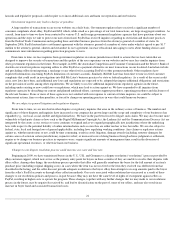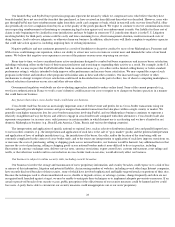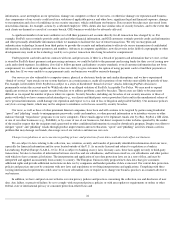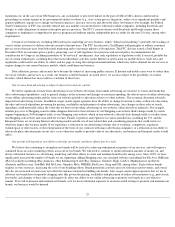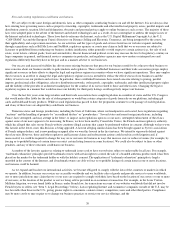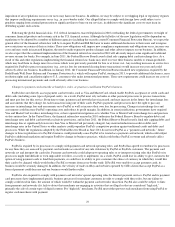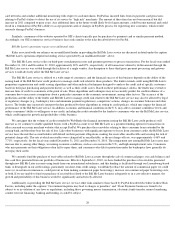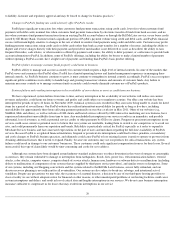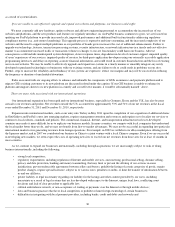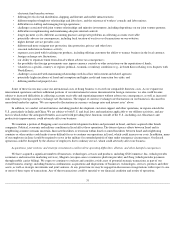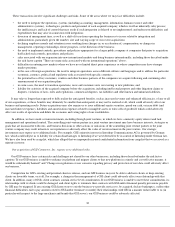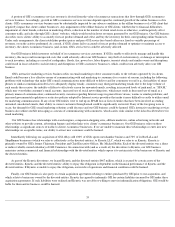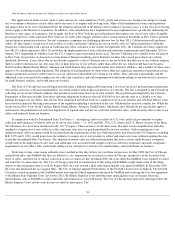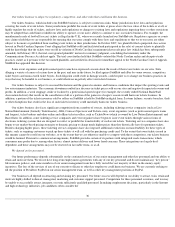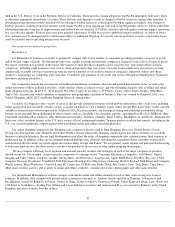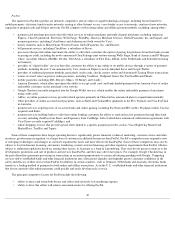eBay 2011 Annual Report Download - page 36
Download and view the complete annual report
Please find page 36 of the 2011 eBay annual report below. You can navigate through the pages in the report by either clicking on the pages listed below, or by using the keyword search tool below to find specific information within the annual report.
electronic fund transfer systems;
Some of these factors may cause our international costs of doing business to exceed our comparable domestic costs. As we expand our
international operations and have additional portions of our international revenues denominated in foreign currencies, we also could become
subject to increased difficulties in collecting accounts receivable and repatriating money without adverse tax consequences, as well as increased
risks relating to foreign currency exchange rate fluctuations. The impact of currency exchange rate fluctuations on our business is discussed in
more detail under the caption “We are exposed to fluctuations in currency exchange rates and interest rates” above.
In addition, we conduct certain functions, including product development, customer support and other operations, in regions outside the
U.S., particularly in India and China. We are subject to both U.S. and local laws and regulations applicable to our offshore activities, and any
factors which reduce the anticipated benefits associated with providing these functions outside of the U.S., including cost efficiencies and
productivity improvements, could adversely affect our business.
We maintain a portion of Shopping.com's research and development facilities and personnel in Israel, and have acquired other Israeli
companies. Political, economic and military conditions in Israel affect those operations. The future of peace efforts between Israel and its
neighboring countries remains uncertain. Increased hostilities or terrorism within Israel or armed hostilities between Israel and neighboring
countries or other entities could make it more difficult for us to continue our operations in Israel, which could increase our costs. In addition, many
of our employees in Israel could be required to serve in the military for extended periods of time under emergency circumstances. Our Israeli
operations could be disrupted by the absence of employees due to military service, which could adversely affect our business.
Acquisitions, joint ventures and strategic investments could result in operating difficulties, dilution, and other harmful consequences.
We have acquired a significant number of businesses, technologies, services and products, including GSI Commerce, Inc. (which provides
ecommerce and interactive marketing services), Magento (an open source ecommerce platform provider) and Zong (which provides payments
through mobile carrier billing). We expect to continue to evaluate and consider a wide array of potential strategic transactions as part of our
overall business strategy, including business combinations, acquisitions and dispositions of businesses, technologies, services, products and other
assets, as well as strategic investments and joint ventures. At any given time we may be engaged in discussions or negotiations with respect to one
or more of these types of transactions. Any of these transactions could be material to our financial condition and results of operations.
31
•
differing levels of retail distribution, shipping and Internet and mobile infrastructures;
•
different employee/employer relationships and labor laws, and the existence of workers' councils and labor unions;
•
difficulties in staffing and managing foreign operations;
•
challenges associated with joint venture relationships and minority investments, including dependence on our joint venture partners;
•
difficulties in implementing and maintaining adequate internal controls;
•
longer payment cycles, different accounting practices and greater problems in collecting accounts receivable;
•
potentially adverse tax consequences, including local taxation of our fees or of transactions on our websites;
•
higher Internet service provider costs;
•
different and more stringent user protection, data protection, privacy and other laws;
•
seasonal reductions in business activity;
•
expenses associated with localizing our products, including offering customers the ability to transact business in the local currency;
•
foreign exchange rate fluctuations;
•
our ability to repatriate funds from abroad without adverse tax consequences;
•
the possibility that foreign governments may impose currency controls or other restrictions on the repatriation of funds;
• volatility in a specific country's or region's political, economic or military conditions (e.g., in South Korea relating to its disputes with
North Korea);
•
challenges associated with maintaining relationships with local law enforcement and related agencies;
•
potentially higher incidence of fraud and corruption and higher credit and transaction loss risks; and
•
differing intellectual property laws.


